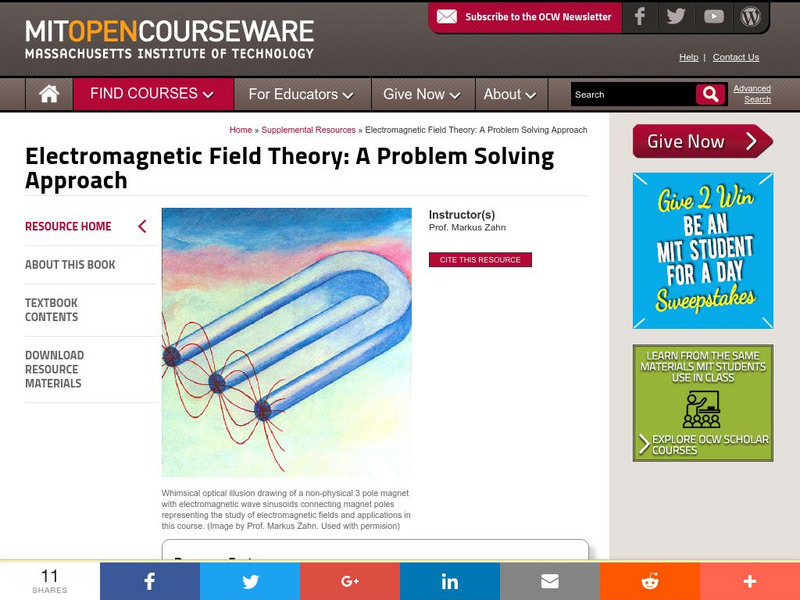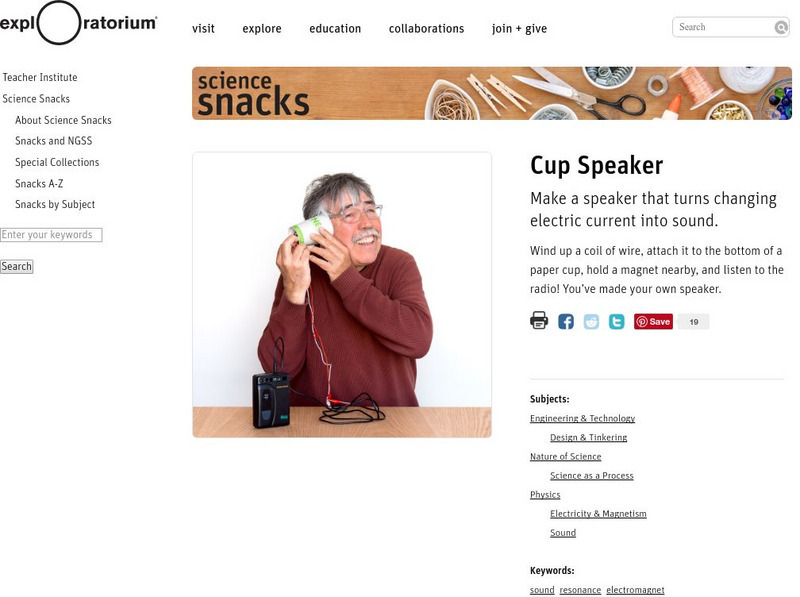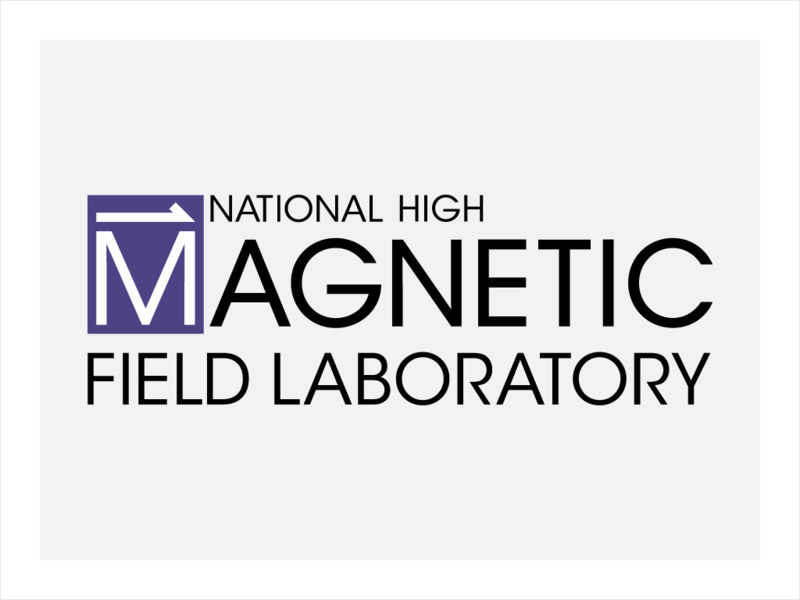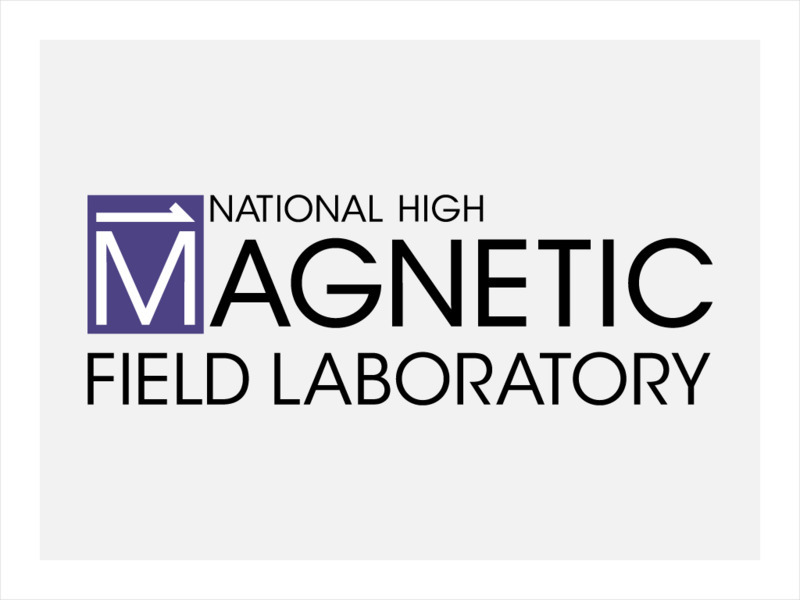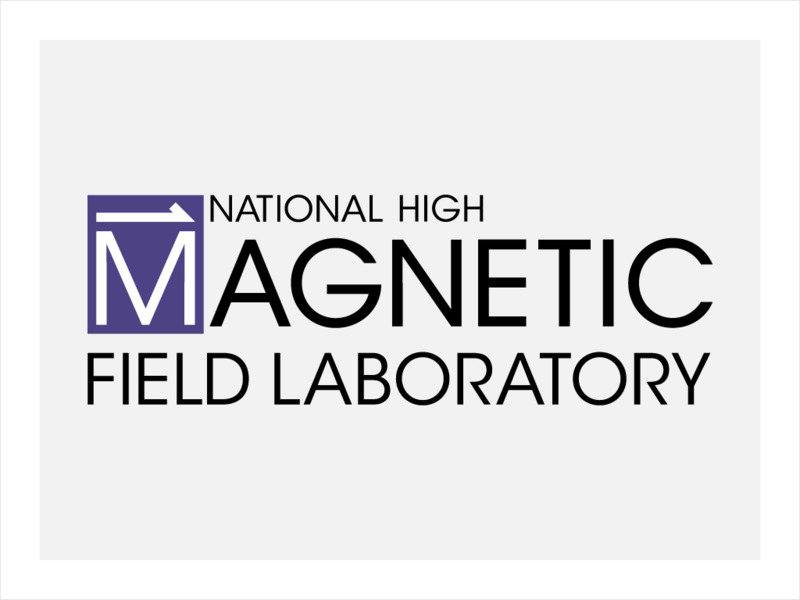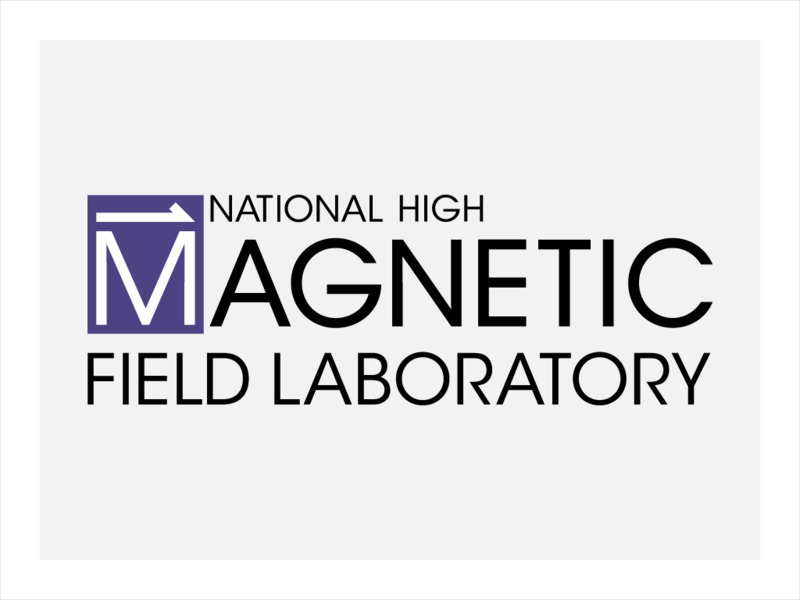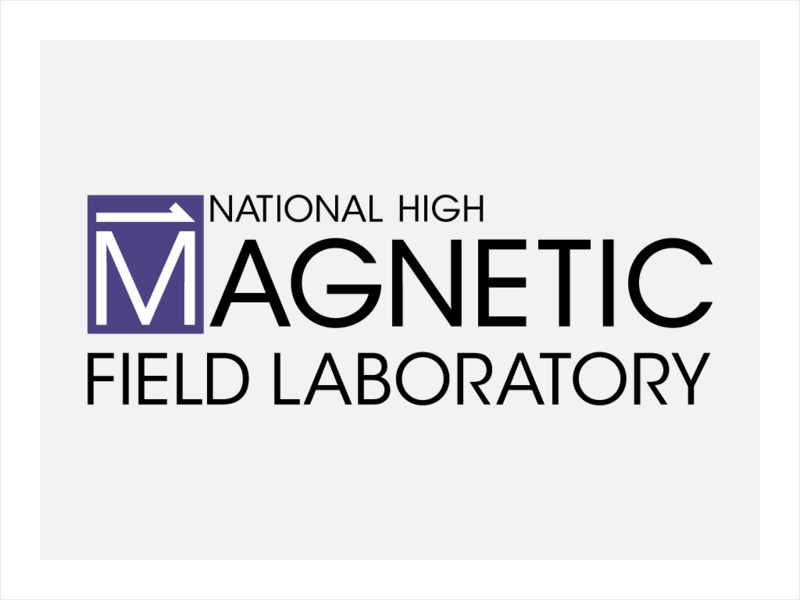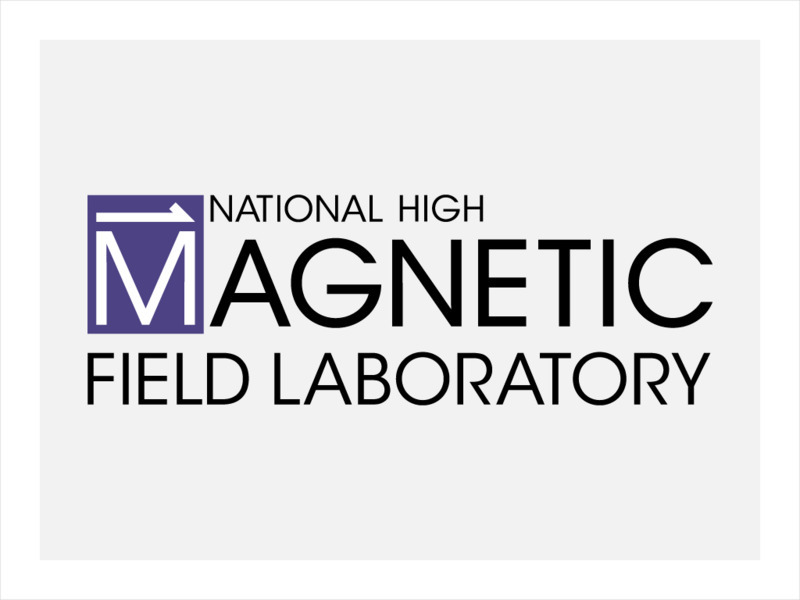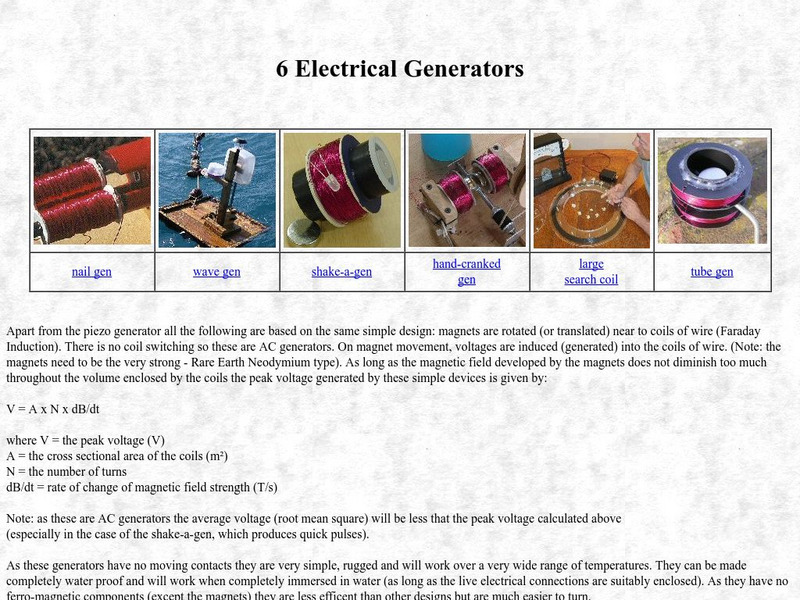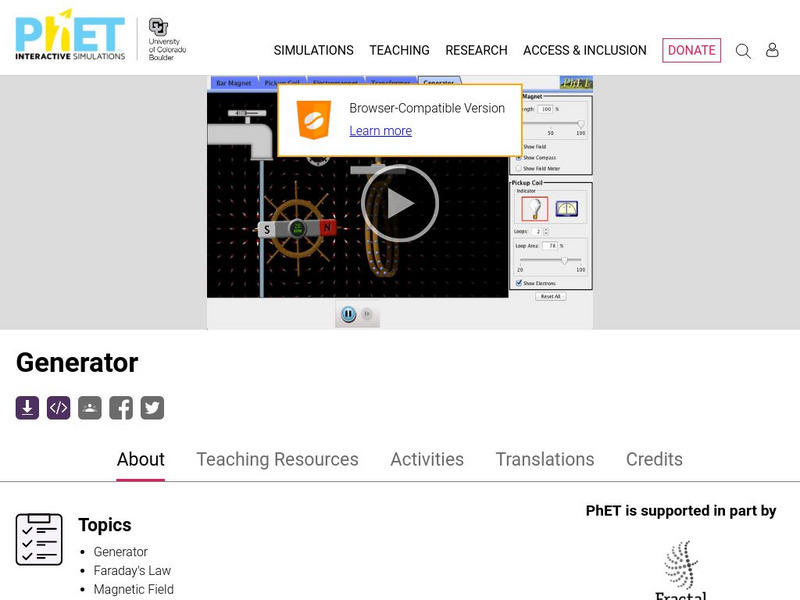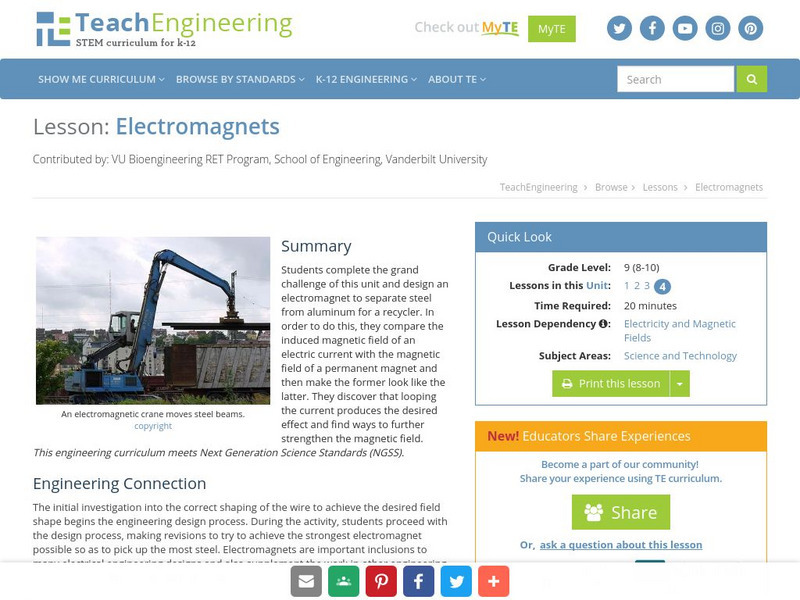Physics Aviary
Physics Aviary: Rail Gun Lab
This lab was designed to have students test the factors that affect the acceleration of a metal bar that is carrying a current through a magnetic field.
Famous Scientists
Famous Scientists: Hans Christian Oersted
Learn how Hans Christian Oersted's discoveries in electricity led him to discover electromagnetism.
Massachusetts Institute of Technology
Mit: Open Course Ware: Resources: Electromagnetic Field Theory
College-level electrical engineering textbook starting from the Coulomb-Lorentz force law on a point charge. Sample problems that reinforce the content are found at the end of each chapter. Includes downloadable excerpts of the textbook...
Exploratorium
Exploratorium: Science Snacks: Cup Speaker
This activity will have students creating their own speaker with a paper cup, coil of wire, and magnet. The speaker operates by changing electric current into sound.
ClassFlow
Class Flow: Electricity
[Free Registration/Login Required] Students can use this Flipchart to learn and apply Ohm's law to basic circuitry problems. Students are introduced to the relationship among voltage, current, and resistance, and then apply their newly...
Walter Fendt
Walter Fendt: Direct Current Electrical Motor
This simulation is an example of an elementary operation of a DC motor, showing its main parts.
Science and Mathematics Initiative for Learning Enhancement (SMILE)
Smile: Introduction to Magnets (Classroom Unit)
A teacher unit which includes several hands-on activities about types of magnets, magnetism, and electrostatics. An activity designed to suit all grade levels. Many parts of the activity would be easily adaptable as a student project.
Physics Aviary
Physics Aviary: Magnetic Induction Lab
This lab was designed to have students test the things that can induce a current in a coil of wires. This lab is a purely quantitative lab.
National High Magnetic Field Laboratory
Magnet Academy: Arc Lamp 1876
Fire lighted the night for many centuries. Then came Sir Humphry Davy and the birth of the arc lamp, an invention built upon in the years that followed by many.
National High Magnetic Field Laboratory
Magnet Academy: Bubble Chamber 1952
To understand a bubble chamber, picture the long, white streak an airplane leaves in its wake. That's water vapor produced by condensation from the plane's hot exhaust. Until the water particles evaporate, you can follow the streak to...
National High Magnetic Field Laboratory
Magnet Academy: Cyclotron 1931
A cyclotron is a machine that allows scientists to shoot particle beams at other particle beams. The result of doing this is a spectacular smash up - but that's not why scientists do it.
National High Magnetic Field Laboratory
Magnet Academy: Coaxial Cable 1929
As more and more American households acquired telephones, the pressure was on to create a better cable to accommodate the increasing demand. Engineers Lloyd Espenschied and Herman Affel answered the call.
National High Magnetic Field Laboratory
Magnet Academy: Audion 1906
Two years after Englishman John Ambrose Fleming invented a two-electrode vacuum tube, American inventor Lee De Forest one-upped him by developing a tube with three electrodes.
National High Magnetic Field Laboratory
Magnet Academy: Gauss Weber Telegraph 1833
Several years before the telegraph created by American inventor Samuel Morse revolutionized communications, two German scientists built their own functional telegraph.
National High Magnetic Field Laboratory
Magnet Academy: Gramme Dynamo 1871
Zenobe Theophile Gramme (1826 - 1901) invented the first industrial generator, or dynamo. A deceptively simple-looking machine, it consisted of 30 coils wrapped around a spinning ring of iron.
National High Magnetic Field Laboratory
Magnet Academy: Bell Telephone 1876
Acoustics, variable resistance and allegations of foul play contribute to the exciting story of the invention of the telephone.
Creative Science Centre
Creative Science Centre: 6 Generators
Apart from the piezo generator, all of these generators are based on the same simple design, where magnets are rotated near to coils of wire (Faraday Induction). There is no coil switching so these are AC generators. On magnet movement,...
University of Colorado
University of Colorado: Ph Et Interactive Simulations: Generator
Generate electricity with a bar magnet! Discover the physics behind the phenomena by exploring magnets and how you can use them to make a bulb light. Java required.
TeachEngineering
Teach Engineering: Electromagnets
In this activity, the learners will complete the grand challenge and design an electromagnet to separate steel from aluminum for the recycler. In order to do this, students compare the induced magnetic field of an electric current with...
University of Wisconsin
The Why Files: Got a Jones for Indiana Jones?
Archeologists use radar, magnetic, electrical sensors to see through the ground, find where to dig, sonar, ground-penetrating radar.
Georgia State University
Georgia State University: Hyper Physics: Potential Energy
This site from Georgia State University Physics Department defines and explains the concept of potential energy. Using equations and graphics to illustrate the idea, it discusses the many types of potential energy (gravitational,...
Creative Science Centre
Creative Science Centre: Perhaps the Simplest Homemade Generator in the World
This very simple, but effective generator shows in a wonderfully engaging way the fundamentals of electricity generation. The generator is made from a coil of wire wound around the outside of a plastic 35mm-film can. The two coil ends...
Utah State Office of Education
Utah Science: The Mysterious Force
There is a secret mysterious force in your home right this very moment! Try these activities to first identify that force and then extend your knowledge of the force by investigating the other activities provided.
PBS
Pbs Learning Media: Solar House
In this What's Up in the Environment? video segment, an electrical engineer in Virginia and his 13-year-old son explain how they produce electricity in their home. [3:58]



